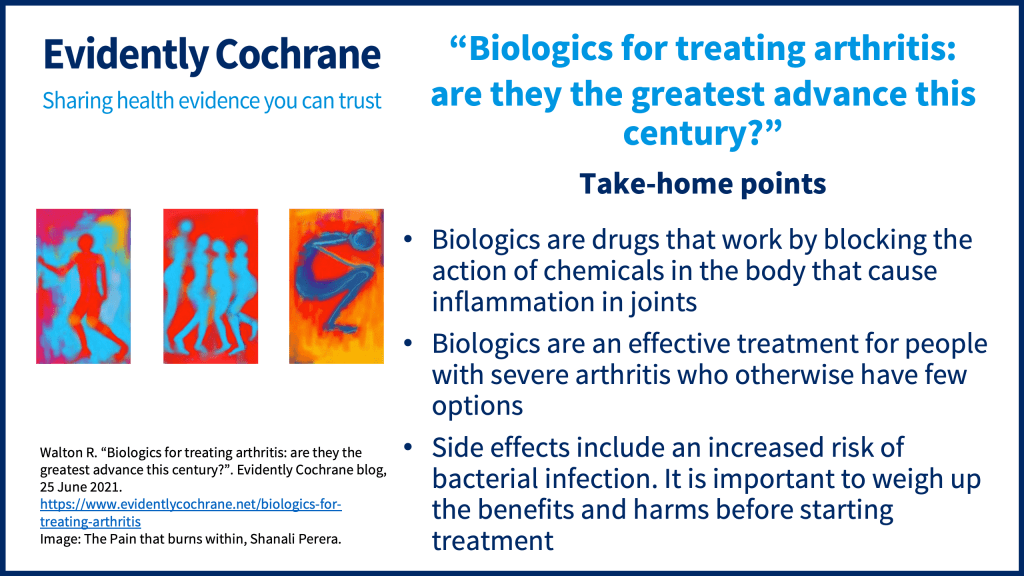In this blog for people with severe arthritis Robert Walton, Senior Fellow in General Practice at Cochrane UK and a very general practitioner, examines Cochrane evidenceCochrane Reviews are systematic reviews. In systematic reviews we search for and summarize studies that answer a specific research question (e.g. is paracetamol effective and safe for treating back pain?). The studies are identified, assessed, and summarized by using a systematic and predefined approach. They inform recommendations for healthcare and research. about biologics – a new generation of drugs to help people with this disabling long term condition.
Page last checked 19 April 2023

It’s a common interview question for junior doctors “What’s the most important advance in medicine in the last 20 years?”. Bespectacled old fogey then smiles triumphantly and relaxes back into the chair while the nervous candidate stammers out a list of treatments hoping one of them will be foremost in the interviewer’s mind. A curious way to select doctors perhaps but an important question nevertheless. Only by looking at the past can we gain some glimmer of insight into what may be possible in the future.
Whilst there is still some way to go there have been remarkable advances in management of long-term conditions causing inflammation of the joints. The advances have come from a deeper understanding of the mechanisms by which tissues are damaged by the inflammatory process. The drugs are somewhat awkwardly named ‘biologics’ because they are made by persuading cells of the immune system to create antibodies to the chemical messengers which cause damage to the tissues. These biologics then either remove the chemical messengers from the bloodstream or block the effects on receptors that are necessary for them to cause inflammation.
As you might expect, there are many different kinds of these new drugs and they are used in a range of different conditions. This blog focuses on Cochrane evidence on biologics for people with arthritis. These drugs have revolutionised the lives of many with the more serious forms of arthritis. Remarkable advances in this area seem set to continue.
Early evidence on biologics for treating rheumatoid arthritis
Initially brought to market in the late 1990s for the treatmentSomething done with the aim of improving health or relieving suffering. For example, medicines, surgery, psychological and physical therapies, diet and exercise changes. of Crohn’s disease, infliximab was the first biologic used for rheumatoid arthritis a few years later. To this date, disease-modifying drugs that non-specifically suppressed the immune system such as gold, sulphasalazine and methotrexate had been the only options for treatment. Whilst these drugs were partially effective, there was a riskA way of expressing the chance of an event taking place, expressed as the number of events divided by the total number of observations or people. It can be stated as ‘the chance of falling were one in four’ (1/4 = 25%). This measure is good no matter the incidence of events i.e. common or infrequent. of severe and predictable unwanted effects. This limited their use in practice.
A Cochrane ReviewCochrane Reviews are systematic reviews. In systematic reviews we search for and summarize studies that answer a specific research question (e.g. is paracetamol effective and safe for treating back pain?). The studies are identified, assessed, and summarized by using a systematic and predefined approach. They inform recommendations for healthcare and research. from that time (2002), summarised the evidence for the new biologic therapy Infliximab for the treatment of rheumatoid arthritis (July 2002). People taking methotrexate and infliximab had an increased chance of their disease responding to treatment than those taking methotrexate alone. Importantly this was associated with reduced chance of long-lasting damage to joints. The treatment offered new hope to people who had little benefit from conventional treatments or who experienced intolerable side effects.
Recent studies confirm the benefits of biologics
Nowadays we have several different ways of tackling the immune mechanisms underlying rheumatoid arthritis. Lumping together all the different biologics targetting the different inflammation pathways, people with rheumatoid arthritis probably have a 60% chance of achieving disease remission on a biologic compared to any other treatment (See Biologics or tofacitinib for people with rheumatoid arthritis naive to methotrexate: a systematic review and network meta‐analysis, May 2017).
Benefits from biologics for arthritis are not confined to rheumatoid disease. The Cochrane Review TNF‐alpha inhibitors for ankylosing spondylitis (April 2015) found that people with ankylosing spondylitis, which is a painful and disabling arthritis affecting the spine, were three to four times more likely to achieve a response when treated with a biologic compared to a placeboAn intervention that appears to be the same as that which is being assessed but does not have the active component. For example, a placebo could be a tablet made of sugar, compared with a tablet containing a medicine.. In addition, those taking a biologic are six times more likely to achieve partial remission of their disease when compared to those taking placebo
All this comes at a cost however. People need to balance the benefits against the risks of biological therapies for arthritis. It is important to weigh up the possible benefits and harms that are likely to occur when making decisions about taking a new treatment. A Cochrane Review of randomisedRandomization is the process of randomly dividing into groups the people taking part in a trial. One group (the intervention group) will be given the intervention being tested (for example a drug, surgery, or exercise) and compared with a group which does not receive the intervention (the control group). trialsClinical trials are research studies involving people who use healthcare services. They often compare a new or different treatment with the best treatment currently available. This is to test whether the new or different treatment is safe, effective and any better than what is currently used. No matter how promising a new treatment may appear during tests in a laboratory, it must go through clinical trials before its benefits and risks can really be known., Adverse effects of biologics: a network meta‐analysis and Cochrane overview (February 2011), showed that rates of serious bacterial infections were increased. Although some really important side effects are very rare, so randomised controlled trialsA trial in which a group (the ‘intervention group’) is given a intervention being tested (for example a drug, surgery, or exercise) is compared with a group which does not receive the intervention (the ‘control group’). which are often small scale and conducted over a relatively short period of time may not be the best way to identify these.
Sad to say though that the advances in treatments for severe inflammatory arthritis have not been carried forward to osteoarthritis, which is the commonest form of arthritis. This is because the disease mechanisms in osteoarthritis are different to those in rheumatoid arthritis and ankylosing spondylitis. As the populationThe group of people being studied. Populations may be defined by any characteristics e.g. where they live, age group, certain diseases. ages, osteoarthritis will be an increasing problem. With greater understanding of the disease processes my hope is that an effective new treatment will be developed – a novel biologic perhaps?
However economic considerations are a major factor in the use of the new biologics – tens of thousands of pounds for a year’s treatment is a hefty price tag. Nevertheless, biologics are available on the NHS for people with severe disease who have either not responded to – or have not been able to take – conventional treatments because of side effects. The drugs are prescribed by hospital consultants who will first make a careful and accurate assessment of the severity of the disease. The economics of these new treatments will change as ‘biosimilars’ become available. Biosimilars are newer versions of the original medicine usually sold at a lower price. There’s a helpful summary about biologics, biosimilars and the diseases that they are used to treat on the NHS web page Biological and biosimilar medicines (biosimilars).
So “biologics for arthritis” would seem to fit the bill as a winning answer to that interview question – so long as the old fogey with the spectacles thinks so too!
Join in the conversation on Twitter with @rtwalton123 and @CochraneUK or leave a comment on the blog.
Please note, we cannot give medical advice and do not publish comments that link to individual pages requesting donations or to commercial sites, or appear to endorse commercial products. We welcome diverse views and encourage discussion but we ask that comments are respectful and reserve the right to not publish any we consider offensive. Cochrane UK does not fact check – or endorse – readers’ comments, including any treatments mentioned.



This is why I love science. The continuous research to improve the lives of millions of people. I have had reactive arthritis since 1986, which has caused ankylosing spondylitis, rheumatoid, and osteoarthritis, over the years. I have lost count of how many drugs I have tried over the years. I used to eat painkillers like sweets. Now I am older, and wiser, I know that is not the way to go.
Making use of the latest research is the answer. I have to change meds every few years, as my body seems to get used to what I am on. One thing that has worked is exercise. As someone who lives with arthritis, I have found that exercise is crucial for managing my symptoms and maintaining my overall health. While it can be challenging to stay active when joints are stiff and painful, I have found that regular exercise can help to improve my mobility and reduce my pain. My main exercise is an exercise bike, as it is low impact, and can be done at my own speed, even when watching a Tour de France video.
I have not tried biologics, but they are available to me if I ever need them. Thank you for the article.